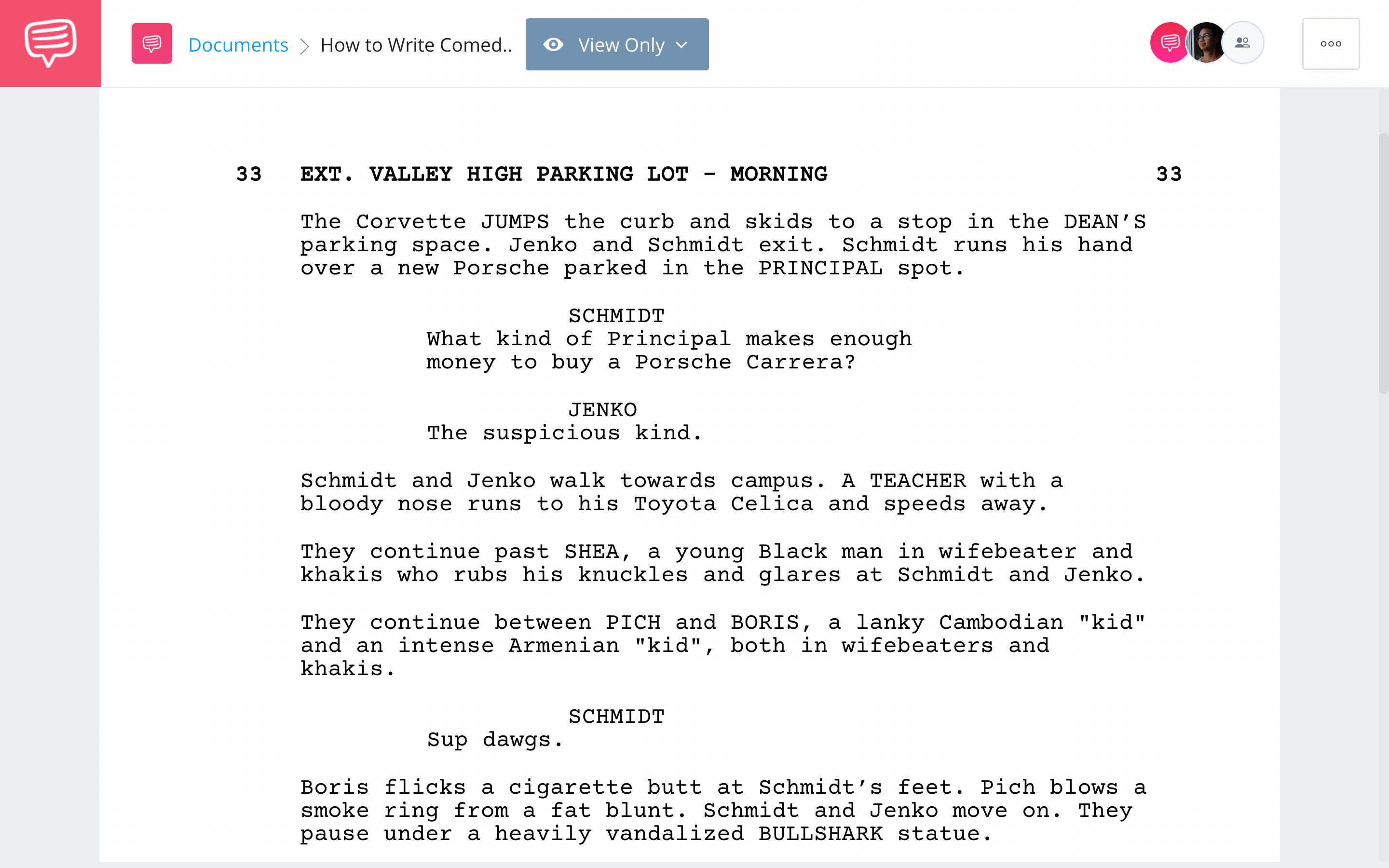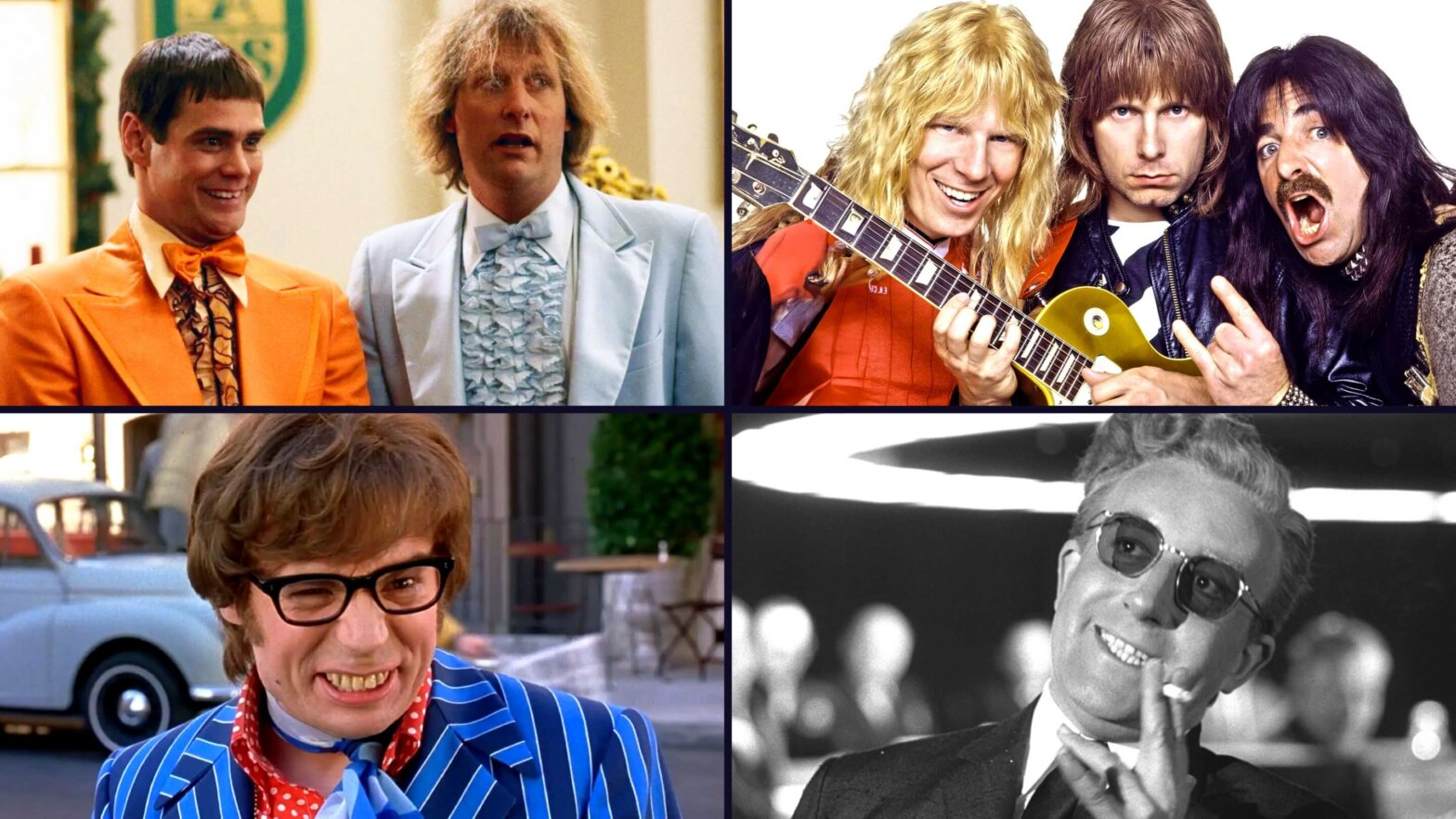

A sk any creative writer what the hardest genre to write is and they’ll probably tell you that it’s comedy. That’s because story structure can only bring you so far in comedy writing – the fact of the matter is that if you aren’t funny, you aren’t funny. So how do you become funny? Do you read joke books? No! Like everything else, you practice until you become perfect – well, not perfect per se – most comedy writers would be happy with just okay. We’re going to show you how to write comedy, with script examples from 21 Jump Street and Curb Your Enthusiasm , but first, let’s define comedy writing.
In simplest terms, comedy writing is a genre of writing that is intended to be funny. There’s much more to it than that, but first and foremost, the chief goal is to make the audience laugh. Let’s watch a quick video to hear one of the most successful comedy writers of all-time, Jerry Seinfeld, explain the basics of comedy writing.
Comedy writing is something you don’t see people doing. It’s a secretive thing.
As Seinfeld suggests, comedy writing is a very secretive thing. One reason why is because most comedy writers feel like their material has to be perfect before it’s presented.
Think about it this way: let’s say you write a dramatic stage play. There’s no way to tell if the audience hated it – except if they fell asleep, then I’d say it’s fair to say they hated it. Now let’s say you write a comedic play. If the audience doesn’t laugh at the jokes, then you know they hated it.
You know, they know, everybody knows – a joke that doesn’t land is a special type of shame. It’s for this reason that comedy writing can feel so personal. The most important thing to remember is that nobody is funny 100% of the time, but by taking inspiration from some of the best, we can improve our craft.
Comedy writing doesn’t have to be a solitary craft. Due to the advent of the internet, comedy is more collaborative now more than ever. This next video explains how the Lonely Island sketch “Dear Sister” helped to usher in a new era of comedy.
The difference between Seinfeld’s traditionalist advice on comedy writing and Karsten Runquist’s new-age analysis is that one says that comedy is achieved by plot; the other says that plot is achieved by comedy. Think of memes for example: what makes a meme funny? Well, I’d say memes are funny because somebody doesn’t “get it.”
A meme is like an inside joke between millions of people – but once it breaks out of that “inside” bubble, then it ceases to be funny. This teaches us something essential about comedy writing; almost always, somebody has to be the butt of the joke. No matter how big or small, somebody has to be made fun of. It’s this very notion that makes comedy writing so difficult.
One of the most difficult aspects of comedy script writing is finding the right person to perform it. You could write something really clever, but if it’s performed in a tone that’s incongruent to what you mean, then it’s not going to sound funny.
So when writing any sort of comedy, don’t be afraid to add emphasis. That’s true in more ways than one – emphasize the punch-lines to your jokes, emphasize specificity, and emphasize contradictions.
Like any type of writing, comedy writing relies on conflict. In this scene from Meet the Parents, the family patriarch Jack interrogates his daughter’s boyfriend Greg. Pay attention to how screenwriters Jim Herzfeld and John Hamburg entice us with character conflict.
I wanted to look at this scene for a couple reasons. The first is that it’s a great structural example of how to put together a comedic scene. The mean dad, clueless boyfriend trope is just that. a trope. So how do the writers make it feel refreshing and new?
Well, it starts with emphasis and exaggeration. Jack isn’t just any dad, he’s a former CIA operative. And Greg’s not just a clueless boyfriend, he’s a walking bad-luck charm. So in a structural sense, this relationship is primed for comedic conflict.
Here are five great tips for writing a comedy scene:
Now let’s see how Meet the Parents utilizes these five strategies.
Would you believe me when I say there’s a secret technique you can use to instantly make any scene funnier? No, that sounds too good to be true! But alas, it is.
The technique known as irony – which is defined as being the opposite of what we expect – can turn any scene on its head.
We imported the 21 Jump Street screenplay into StudioBinder’s screenwriting software to take a closer look at a great example of irony. As you’re reading, think about how (and why) we expect “Valley High” to conform to a stereotype.

21 Jump Street went through a lengthy rewrite process. In this revision of the script, undercover cops Jenko and Schmidt arrive at a scene somewhat akin to what we see in the original tv show. There’s nothing wrong with the scene as it was originally written – but the final version of the scene shows just how much a difference irony can make.
Here, Jenko takes the lead, expecting to command the crowd like he did in high school. But as Bob Dylan famously said, the times are a-changin’.